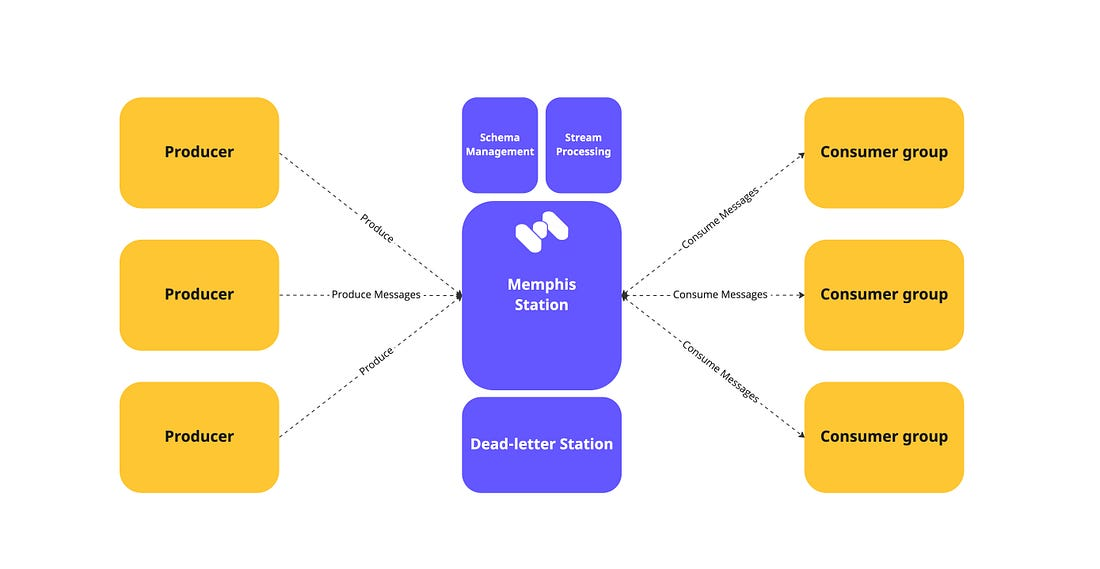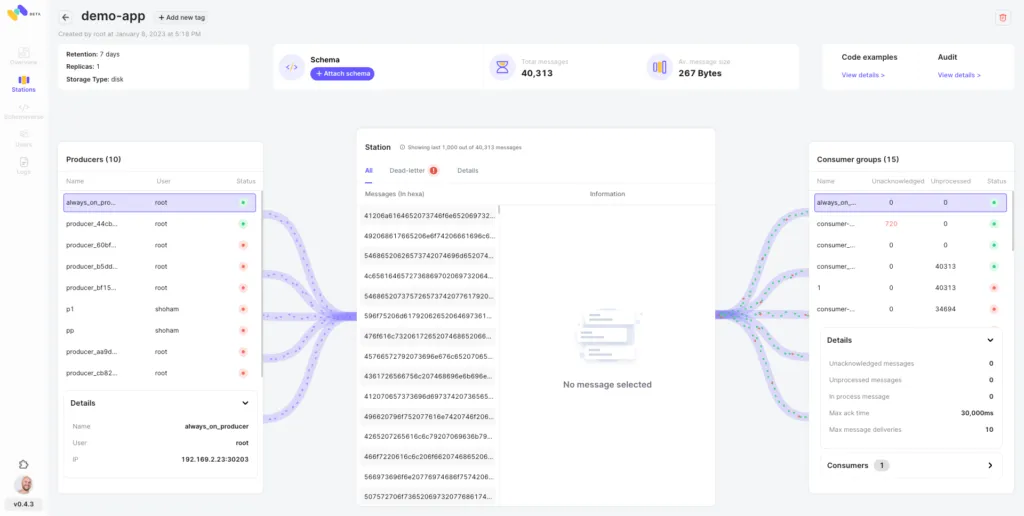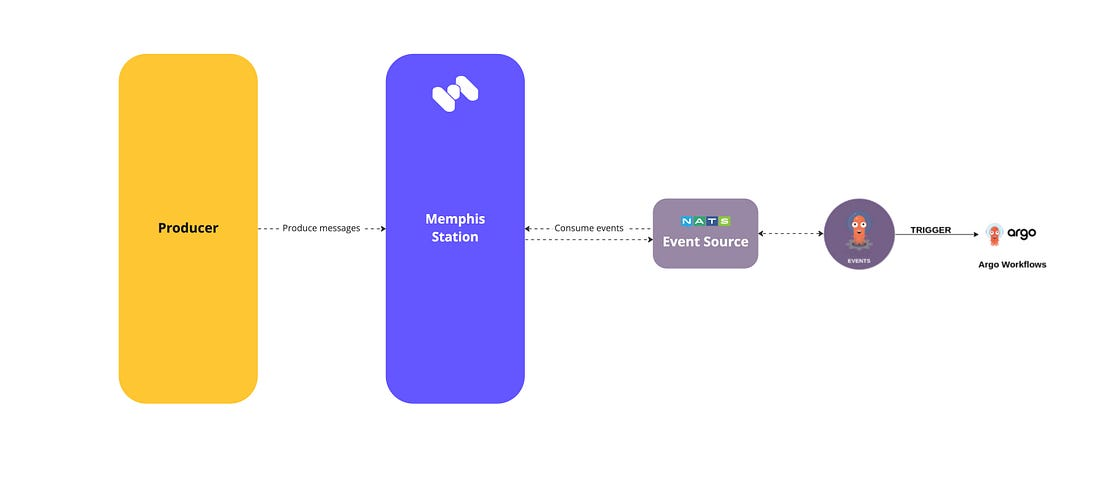Connect Memphis as an Argo Event Source
This article shows how Memphis provides multiple features that enhance the experience with Argo.
Join the DZone community and get the full member experience.
Join For FreeIntroduction
Argo is a collection of open-source tools for Kubernetes to run workflows, manage clusters, and do GitOps easily. Memphis is an open-source next-generation alternative to traditional message brokers. Among Argo tools, Argo Workflows can be found. Kubernetes-native workflow engine supporting DAG and step-based workflows.
Some Argo Workflow Features
- Define workflows where each step in the workflow is a container.
- Model multi-step workflows as a sequence of tasks or capture the dependencies between tasks using a graph (DAG).
- Easily run compute-intensive jobs for machine learning or data processing in a fraction of the time using Argo Workflows on Kubernetes.
- Run CI/CD pipelines natively on Kubernetes without configuring complex software development products.
Argo-defined workflows can be triggered by incoming events which arrive from a component called “Event Source.” Multiple event sources can be used simultaneously.
Using Memphis as an Argo Workflows Event Source
Memphis provides multiple features that enhance the experience with Argo, like:
- Full GUI with real-time observability
- Schema management and transformation
- REST Webhooks
- Dead-Letter Queue with automatic message retransmit
- Serverless stream enrichments
- SDKs: Node.JS, Go, Python, TypeScript, NestJS
One of the key advantages of using Memphis is the ability to troubleshoot complicated async processes using message tracing, data-level observability, self-healing policies, and real-time notifications, which can be a great help, especially for auditing and logging when events and triggers are fired from multiple places towards your Argo and potentially can create highly expensive resources and workflows.


Memphis can be integrated with Argo workflows as an Argo Event Source. An Event Source defines the configurations required to consume events from external sources like Memphis, NATS, AWS SNS, AWS SQS, GCP PubSub, Webhooks, etc.

Flow
- Create event source YAML file
- Create memphis-creds secret in Argo-evens namespace
- Create Event Source resource
- Create sensor resource YAML file
- Create sensor resource
- Wrap the subject with a stream
Step 1: Create Event Source YAML File
Create a file called memphis_eventsource.yaml
apiVersion: argoproj.io/v1alpha1
kind: EventSource
metadata:
name: memphis
spec:
nats:
example:
# url of the nats service
url: nats://<MEMPHIS_BROKER_URL>:6666
# jsonBody specifies that all event body payload coming from this
# source will be JSON
jsonBody: true
# subject name = memphis station
subject: argo_workflows
auth:
token:
name: memphis-creds
key: CONNECTION_TOKEN
# optional backoff time for connection retries.
# if not provided, default connection backoff time will be used.
connectionBackoff:
# duration in nanoseconds, or strings like "4s", "1m". following value is 10 seconds
duration: 10s
# how many backoffs
steps: 5
# factor to increase on each step.
# setting factor > 1 makes backoff exponential.
factor: 2
jitter: 0.2Step 2: Create “Memphis-Creds” Secret in “Argo-Events” Namespace
kubectl create secret generic memphis-creds \
--from-literal=CONNECTION_TOKEN=<APPLICATION_USER>::<CONNECTION_TOKEN> \ -n argo-eventsStep 3: Create Event Source Resource
kubectl apply -f memphis_eventsource.yaml
Step 4: Create Sensor Resource YAML File
Create a file called memphis_sensor.yaml
apiVersion: argoproj.io/v1alpha1
kind: Sensor
metadata:
name: memphis
spec:
template:
serviceAccountName: operate-workflow-sa
dependencies:
- name: test-dep
eventSourceName: memphis
eventName: example
triggers:
- template:
name: memphis-workflow-trigger
k8s:
operation: create
source:
resource:
apiVersion: argoproj.io/v1alpha1
kind: Workflow
metadata:
generateName: memphis-workflow-
spec:
entrypoint: whalesay
arguments:
parameters:
- name: message
value: hello world
templates:
- name: whalesay
inputs:
parameters:
- name: message
container:
image: docker/whalesay:latest
command: [cowsay]
args: ["{{inputs.parameters.message}}"]
parameters:
- src:
dependencyName: test-dep
dest: spec.arguments.parameters.0.valueStep 5: Create Sensor Resource
kubectl apply -f memphis_sensor.yaml
Step 6: Wrap the NATS Subject With a Stream
As Memphis works with streams, wrapping the subject will enable Memphis to control the subject.
To complete that step, NATS cli is needed.
For creating Memphis application-type users, read here.
nats stream add -s <MEMPHIS_BROKER_URL>:6666 --user=<MEMPHIS_APPLICATION_USER>::<MEMPHIS_CONNECTION_TOKEN>
? Stream Name argo_event_source
? Subjects argo_workflows
? Storage file
? Replication 3
? Retention Policy Limits
? Discard Policy Old
? Stream Messages Limit -1
? Per Subject Messages Limit -1
? Total Stream Size -1
? Message TTL -1
? Max Message Size -1
? Duplicate tracking time window 2m0s
? Allow message Roll-ups No
? Allow message deletion Yes
? Allow purging subjects or the entire stream Yes
Stream argo_event_source was created
Have a great day!
Published at DZone with permission of Valera Bronshtein. See the original article here.
Opinions expressed by DZone contributors are their own.

Comments